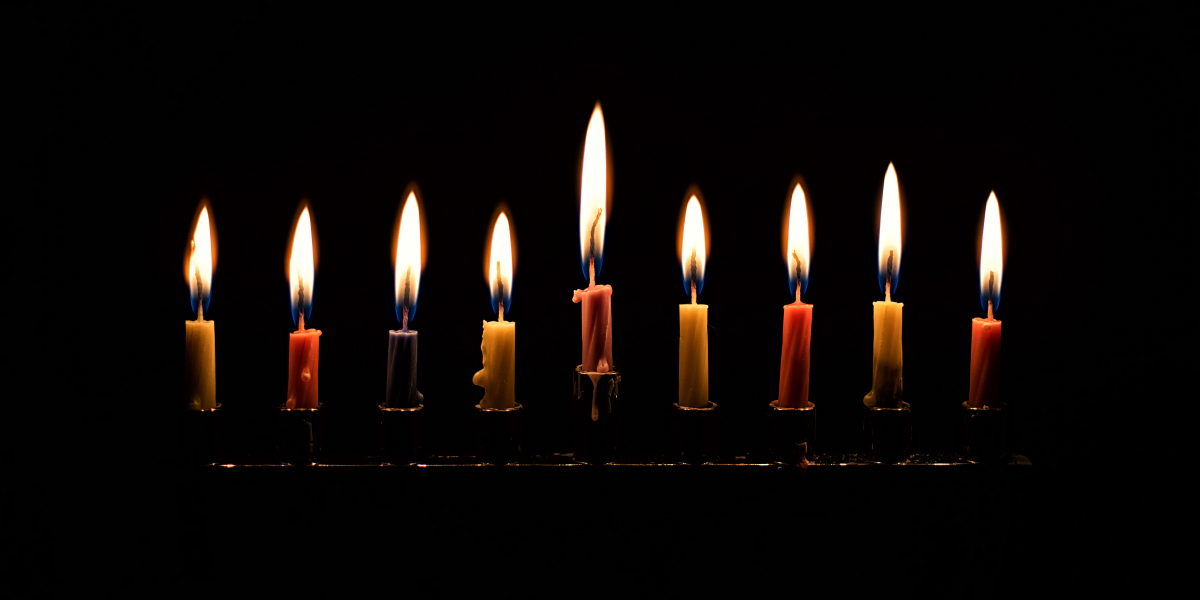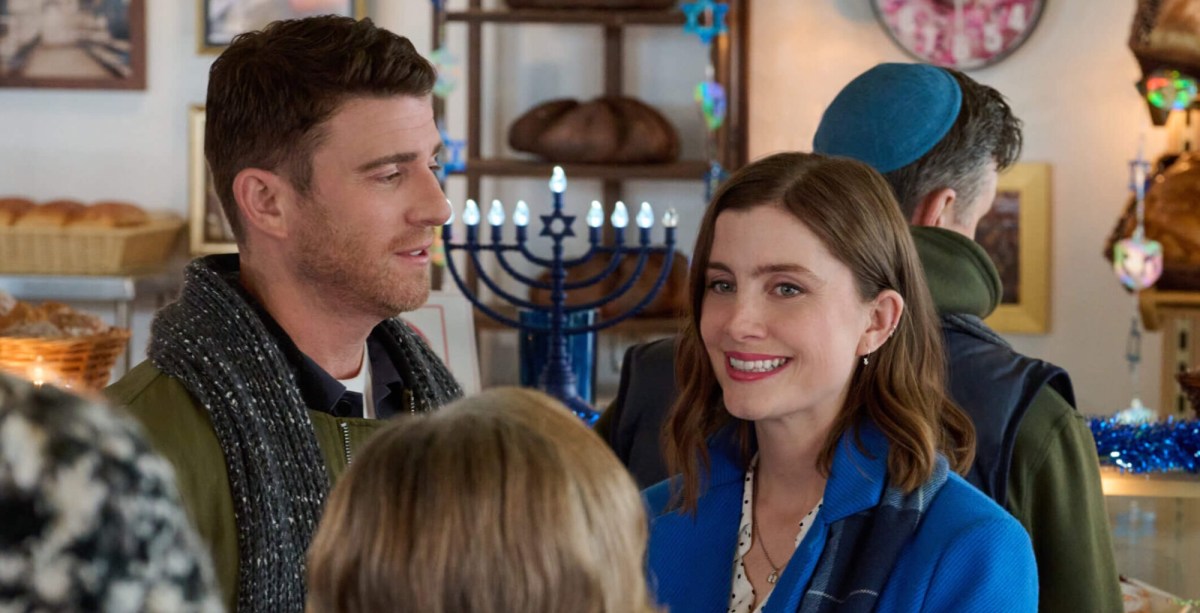Feature image by Natalia Ganelin via Getty Images
To agonize over the meaning of Hanukkah for the first time this year is to buy into the big lie being peddled by the Israeli government, the American government, and Zionists around the world that violence in Palestine began on October 7.
Growing up, Judaism and Jewish tradition were told to me through the lens of a victim complex. I was taught Jews were the chosen people — biblically chosen to be in covenant with God — and felt confused why God’s chosen people always seemed trapped in the book of Job. From the Passover story to the Purim story to the Hanukkah story to more contemporary examples like Russian pogroms and the Holocaust, it seemed like everyone always wanted to kill the Jews. And yet, we triumphed and lived on.
The violence of these stories and historical fact were not ignored, but they were simplified for a child’s consumption into tales of victory. Even as we learned of the six million Jews murdered in the Holocaust, we were also fed a narrative of Hitler’s failures and of the allied powers of the U.S., France, and Great Britain winning a noble war against fascism.
It’s fitting that the six-pointed star associated with Judaism is named the Star of David, because so many of our stories are told through a David and Goliath framing. The Jewish people suffer, and then, against all odds, we survive — we win. Pay no attention to the nuance of these stories and historical moments. Pay no attention to the rest of the Torah that documents David’s horrific violence once he was declared King.
I reconnected with my Jewish faith in my early twenties when I realized the oversimplified Judaism of my childhood was, actually, counter to the fundamentals of Jewish teaching. My temple’s approach to Reform Judaism was not increased inclusivity, but rather a reduction of Judaism to simple traditions and community based on bloodline. That didn’t have to be the case.
Especially once I came out, I found Jewish community where people leaned toward the questioning of the Jewish religion. My Hebrew school curiosities that had been written off as precocious annoyance turned out to be a fundamental part of my religion. For me, and so many Jewish people, the lack of certainty, the encouragement of complex discussion, is what connects us to our faith.
On Friday night — Shabbat, the second night of Hanukkah, and the 36 year anniversary of the First Intifada — I entered into one of these complicated Jewish spaces with a sigh of relief. Making Mensches and Kolot Anti-Zionist Minyan hosted an anti-Zionist Hanukkah Shabbat in Manhattan. Over a hundred people — Jewish and otherwise — gathered for a potluck and a ritual.
Since the Hamas attack on October 7 and the resulting increase in Israeli violence against Palestinians, my relationship to Judaism has felt fraught. I can remind myself the Israeli government does not represent all Judaism, but it’s difficult to hold onto that fact when I’ve spent the last two months having upsetting conversations with Jewish family — even more upsetting than ones I’d already been having with them about Israel for nearly a decade. It’s difficult to hold onto Judaism’s separation from Israel when the United States government is funding Israel’s genocide of Palestinians under the guise of fighting antisemitism.
I’ve been inspired by the actions of Jewish organizers over the last two months. I’ve also grown frustrated with the limits of Jewish identity as an authority in opposition to genocide. Yes, I feel an obligation to speak out against the Israeli government when my religion is their excuse for violence. But I also feel an obligation to speak out against the Israeli government simply as a human being. Furthermore, I don’t think Jewish voices should be centered in a moment when Palestinians are being murdered. I understand it strategically, but I still find it grotesque — especially as the weeks drag on, the violence increases, and the same circuitous debates continue.
At the event on Friday, one of the leaders, Elana Lipkin, began by discussing the Hanukkah story as one that can be particularly challenging for anti-Zionist Jews, because it is celebrated by many as a tale of Jewish people reclaiming Israeli land. But, Lipkin suggested, it can just as easily be celebrated as a tale of any resistance movement fighting back against colonial oppression. Religion and religious texts often act as Rorschach tests: People choose an interpretation that connects with their values.
What strikes me most about this obvious reframe is the decentering of Jewish people as uniquely oppressed. It’s possible — nay, necessary — to honor the realities of antisemitism in history and in the present without pretending as if we’re alone in our experiences of oppression. It’s also important to acknowledge that a group being oppressed does not mean it can’t also be an oppressor.
What would Judaism look like without self-victimization? It would mean moving beyond the idea of us as a chosen people — chosen for misery or chosen for greatness — and looking to these stories for inspiration of resistance. Not a uniquely Jewish resistance but a resistance we can support and encourage from any oppressed people. It would also mean an admission of the possibility that Jewish people can act as oppressors, whether we’re talking about the Israeli occupation of Palestine or the bigotry held by Jewish Americans who have run toward assimilation and white supremacy.
To gather for an anti-Zionist Jewish celebration is to do so for ourselves. It’s to create a space where we’re free to practice our traditions away from those in our larger community who are using these same traditions as an excuse for violence. But its importance for fighting the ongoing violence shouldn’t be overstated. Lipkin said, “Tonight we rest and heal. Tomorrow the struggle continues.” I appreciated this acknowledgment that we were gathered to celebrate Hanukkah. The anti-Zionism of the event didn’t mean we were doing anything in the struggle other than taking a moment to relax and reflect, a moment that in itself is a privilege.
After the Shabbat prayers, but before the Hanukkah songs, we split into small discussion groups to talk of questions ranging from what brought us to this space to how the fight for liberation can be made sustainable. There is value to intracommunity discussion that does not center itself. We gather not only to celebrate our Jewish holidays but so we can discuss difficult topics outside of the public sphere.
Jewish people who have lost or weakened relationships with family due to conversations about Israel may have experienced and be experiencing grief — it is not a grief equal to those who have lost family at the hands of the Israeli government. As human beings, we likely mourn the immense loss of life we’re witnessing from afar, but that mourning should not pull focus from those in mourning for their loved ones. This Shabbat was a space for that lesser grief, that lesser mourning. It’s important to find that in friends and in community so we’re better equipped to fight for other oppressed people without falling into the belief that our feelings, as Jews, as Americans, are somehow most important.
The most impactful moment of the night was a speech given before the Mourner’s Kaddish. The speaker raised the point that in Jewish tradition we sit shiva for the first seven days after a death to provide support to those who are most grieving. To say the Mourner’s Kaddish for the lives lost in Palestine, when their loved ones were not given time to grieve, when they weren’t allowed to practice their own mourning rituals in a time of peace, when the violence continues even as we gather, is a grossly insufficient use of our own traditions.
And yet, after this powerful speech concluded, we said the Mourner’s Kaddish. Because it was Shabbat. Because that is our tradition. Because people in the room were grieving their own losses. Because Judaism is about holding multiple truths at once. Because we were grieving. Because we are grieving.








Comments
As someone experiencing the grief of watching a genocide unfold from afar, and that lesser grief of confronting the hateful rhetoric of Zionist family members, your words resonated deeply with me. Thank you for sharing this space with the Autostraddle community, Drew.
I am not Jewish, I am pro Muslin and pro Judaism, and I am anti zionist, and I love how you frame things, Drew. I too separate Jewish people from Israel, and I separate Jewish people from the abominable Israeli and US govts. There are so many Jewish folk in Israel, globally, and within the US, who condemn and protest the Israeli govts genocide towards the Palestinian people. I condemn strongly the Israeli govt, and the US govt for supporting the Israeli govt.
Thank you so much for saying this. I couldn’t agree more. Free Palestine from the river to the sea.
“Because Judaism is about holding multiple truths at once.” Rabbi Danya Ruttenberg writes “Life is a Sacred Text” on substack. She has written some really good words about this. Rabbi Danya IDs as queer and is part of Conservative Judaism which, I think, is the most liberal of the branches of Judaism. Her most recent post was titled Hanukah and Adult Faith, very readable and interesting to me. I was raised in a liberal Protestant tradition.
Reform is the most liberal. Conservative sits in between Reform and Orthodox. It heavily attracts Jewish people who are politically liberal but want to hew to Jewish tradition more closely than Reform does (e.g. keeping kosher, which only a small percentage of Reform Jews do). By the same token, it also attracts Jewish people who are politically conservative but don’t want to follow Jewish tradition quite as strictly as Orthodox does. So although you’ll find a lot of quite liberal people identifying as Conservative Jews, there are enough conservative people identifying as Conservative Jews too to keep that branch from being the most liberal. But Conservative Judaism as a whole is closer, politically, to Reform than to Orthodox.
this is really beautiful Drew. thank you.
This one has been sitting with me all day. We are grieving. We are grieving.
Just wanna really appreciate AS and you, Drew, for continuing to provide coverage and perspective on the violence unfolding before all of us.
I’m a Christian – it feels weird to say that because I was raised in that way but didn’t associate with it for a long time because of how much hypocrisy, cognitive dissonance, and harm I experienced (and saw many others experience) as a queer POC who could see the negative impacts of the religion all around me. But I came back to a faith practice after years of deconstructing and re-learning, often through guidance other queer POC elders of faith, because understanding the traditions and cultural practices of my ancestors was meaningful to me.
I’ve never really thought about what deconstruction might mean for Jewish friends and loved ones – many of whom are culturally Jewish but who are more atheist in belief. I’m realizing now that I sort of stopped seeking a better answer to the “why would we worship a violent God?” question when I found the rather pat answer of “the New Testament God is different than the Old Testament God!” – which I see now as a bit of a cop out in answering the fundamental question. I don’t want to fall into the Christian supremacist trap of simply reducing Judaism to “proto-Christianity” when is its own fully fledged belief system and culture.
And I say all of that to say, thank you for pushing me further in my understanding and appreciation of Jewish thought, particularly when it comes to what deconstruction looks like from a Jewish perspective.
Thank you for writing this Drew. For many years, I tried to distance myself from being Jewish, mostly because of zionism. But I don’t know how not to be Jewish. I am grieving. And I am so relieved thankful and inspired by other anti zionist Jews like your self. As long as there have been Jewish zionists, there have also been anti Zionists who cry out for a just future for everyone. A free Palestine frees us all.
Really? How does it free us all?
How does it free Iranian women? How does it free the Syrian people who were slaughter by their own leader? How does it free the Ukrainians or the Russians?
It does not literally free every person suffering under totalitarian regimes, it’s a figure of speech. “A free Palestine frees us all” means that the world is a better place, even marginally, when we do not allow an apartheid ethnostate
I grew up going to a reformed synagogue and did not continue going once high school hit except for high holidays. As I came into young adulthood, my connection with Judaism ebbed and flowed. However, I always had felt some sort of connection with my Jewish heritage, even though I would consider myself more agnostic. When antisemitism has happened in my community, I have felt a stronger pull to my Jewish family and community. But, I never really knew the history of Israel or Zionism. When Oct 7th happened, the pull to connect with my Jewish community was strong. I feel so grateful to my partner for helping me learn about Zionism and the history of Israel and the Palestinian people. I will admit my first reaction was one that was not full of understanding or empathy for the people of Gaza. I had no foundational knowledge of issues in the region. I have grown over the weeks to have such empathy for and anger on behalf of people of Gaza and separate the Jewish community from the Israeli government. Never again means never again for all people, not just Jews. I have made an effort this Hanukkah to light my Menorah and be thinking about the people who are suffering this genocide in Gaza.
This comment has been removed as it is in violation of Autostraddle’s Comment Policy. Repeat or egregious offenders will be banned.
As a Jewish person, this article in my perspective is harmful. There is absolutely room to have empathy for the people in Gaza while not engaging in gaslighting of antisemitism of the Jewish people. The truth is, data does back up the claim that antisemitism and direct violence against Jews has increased due to October 7th massacre, and yes of course the violence never began there. Historical evidence and documentation prove that antisemitism has always been present at the highest levels in government, media, and journalism. To generalize Judaism and take phrases like “chosen people” completely out of context not only puts other Jewish people in danger, it feeds into unoriginal common propaganda. Since you are speaking from a Jewish perspective this allows non-Jewish folks to really take gravity to your words. As someone who is quite connected to Judaism, I find that many anti-Zionists struggle with connection to the larger Jewish community and also struggle with internalized antisemitism. Not every Jewish person was able to choose where they got their visa too. And Holocaust survivors and Mizrahi Jewish people that were expelled and fled to Israel (Mandatory Palestine at the time) are not colonizers but rather refugees. That’s not victimization, that is just what happened. Interestingly, it is a common antisemitic trope to say “the Jews play victim”. This is a very interestingly thwarted take from someone living a privileged life of safety in the United States, a place well known for being a settler colony.
This is really really really really good. Thank you for this. Jewish people not centering themselves during this, taking the story of triumph over adversity… this this this is what I needed. Thank you Drew
A good Red Scare will get American Zionists to re- state they’re commitment to America. This is day 666 of Israeli refusal to join sanctions against Russia. Fbi-wanted oligarchs enjoy safe haven in Israel.
This comment has been removed as it is in violation of Autostraddle’s Comment Policy. Repeat or egregious offenders will be banned.
Nuanced and beautifully written! I’ve really appreciated your anti-zionist articles, Drew.
I find Autostraddle’s sole consideration of anti-Zionist perspectives one-sided and alienating. As a Jew, why does it seem to be expected that the only valid way of being Jewish or celebrating Hanukkah is to be anti-Zionist?
Because there is currently a genocide being done by Zionists.
I agree. My comments also have been deleted as I have mentioned that a lot of this seems like internalized antisemitism and also has some harmful tropes about “self victimization”